Home | Category: Moses / Moses
MOSES'S BIRTH AND ADOPTION
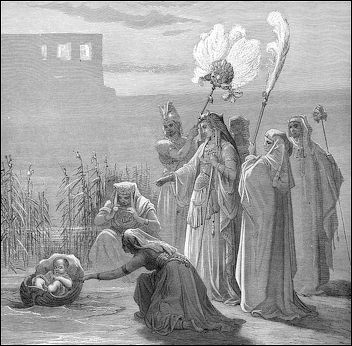
Finding Moses
According to the Bible and the Torah, Moses was born in Egypt to immigrant parents of the servant: Abraham and Jochebed from the Hebrew Levi tribe. After being hidden for three months, Moses was placed by his mother and sister in "an ark of bulrushes, and dabbed it with slime and pitch" and set afloat on the Nile after the Pharaoh issued an edict declaring all male infants born to Israeli slaves had to be killed.☼
Moses was born at time when the Pharaoh was attempting to reduce the number of Jews, by drowning newborn Israelite babies the Nile. The Bible says that the Israelites asked God for help and that he sent them a leader: Moses.
Christians and Jews believe Moses was discovered in the bulrushes by the Pharaoh's daughter. Muslims say he was found by the Pharaoh wife. According to the Judeo-Christian story, after being rescued Moses was adopted by the Pharaoh's daughter and was brought up as a prince in the Egyptian royal court where most likely, if the story is based in fact, he would have learned to read hieroglyphics and ride a chariot just as Ramses the Great at King Tutankhamun had. The Bible provides few details. When Moses was a young man he was informed of his true identity by his sister Miriam.
The tale of Moses’ youth resembles old folk stories from ancient Egypt, Mesopotamia and the Middle East. According to an ancient Assyrian narrative about the Mesopotamian king Akkad, who lived a thousand years before Moses, "My priestly mother conceived me, in secret she bore me. She set me in a basket of rushes, with bitumen sealed my lid." In the Egyptian tale of the God Horas his mother Isis hid him from his wicked uncle Seth.
Websites and Resources: Bible and Biblical History: Bible Gateway and the New International Version (NIV) of The Bible biblegateway.com ; King James Version of the Bible gutenberg.org/ebooks ; Bible History Online bible-history.com ; Biblical Archaeology Society biblicalarchaeology.org ; Judaism Virtual Jewish Library jewishvirtuallibrary.org/index ; Judaism101 jewfaq.org ; torah.org torah.org ; Chabad,org chabad.org/library/bible ; Internet Jewish History Sourcebook sourcebooks.fordham.edu Christianity: BBC on Christianity bbc.co.uk/religion/religions/christianity ; Christian Classics Ethereal Library www.ccel.org ; Sacred Texts website sacred-texts.com ; Internet Ancient History Sourcebook: Christian Origins sourcebooks.fordham.edu ; Biblical Images: Bible in Pictures creationism.org/books ; Bible Blue Letter Images blueletterbible.org/images ; Biblical Images preceptaustin.org
RECOMMENDED BOOKS AND FILMS:
“Ancient Near Eastern Texts Relating to the Old Testament” by James B. Pritchard Amazon.com ;
“Moses: A Life” by Jonathan Kirsh Amazon.com ;
“Great Lives: Moses: A Man of Selfless Dedication” by Charles R. Swindoll, Maurice England, et al. Amazon.com ;
“Moses: In the Footsteps of the Reluctant Prophet” by Adam Hamilton Amazon.com ;
“Moses and Monotheism” by Sigmund Freud Amazon.com ;
“Gregory of Nyssa: The Life of Moses” (HarperCollins Spiritual Classics Amazon.com ;
“Ten Commandments” (film, DVD by
Cecil B. DeMille, with Charleston Heston) Amazon.com ;
“Prince of Egypt” (Dreamworks animation with the voice of Moses supplied by Val Kilmer and his friend Ramses by Ralph Fiennes) Amazon.com
Pharaoh Orders the Jews to Kill Their Infant Boys According to the Bible
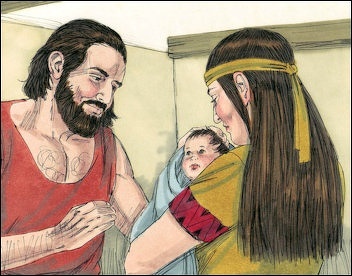
Moses with his biological parents
Exodus 1:15 And the king of Egypt spake to the Hebrew midwives, of which the name of the one was Shiphrah, and the name of the other Puah: 1:16 And he said, When ye do the office of a midwife to the Hebrew women, and see them upon the stools; if it be a son, then ye shall kill him: but if it be a daughter, then she shall live. 1:17 But the midwives feared God, and did not as the king of Egypt commanded them, but saved the men children alive. [Source: King James Version of the Bible, gutenberg.org]
1:18 And the king of Egypt called for the midwives, and said unto them, Why have ye done this thing, and have saved the men children alive? 1:19 And the midwives said unto Pharaoh, Because the Hebrew women are not as the Egyptian women; for they are lively, and are delivered ere the midwives come in unto them.
1:20 Therefore God dealt well with the midwives: and the people multiplied, and waxed very mighty. 1:21 And it came to pass, because the midwives feared God, that he made them houses. 1:22 And Pharaoh charged all his people, saying, Every son that is born ye shall cast into the river, and every daughter ye shall save alive.
Exodus on the Birth of Moses and His Adoption
2:1 And there went a man of the house of Levi, and took to wife a daughter of Levi. 2:2 And the woman conceived, and bare a son: and when she saw him that he was a goodly child, she hid him three months. 2:3 And when she could not longer hide him, she took for him an ark of bulrushes, and daubed it with slime and with pitch, and put the child therein; and she laid it in the flags by the river's brink. 2:4 And his sister stood afar off, to wit what would be done to him. [Source: King James Version of the Bible, gutenberg.org]
2:5 And the daughter of Pharaoh came down to wash herself at the river; and her maidens walked along by the river's side; and when she saw the ark among the flags, she sent her maid to fetch it. 2:6 And when she had opened it, she saw the child: and, behold, the babe wept. And she had compassion on him, and said, This is one of the Hebrews' children. 2:7 Then said his sister to Pharaoh's daughter, Shall I go and call to thee a nurse of the Hebrew women, that she may nurse the child for thee? 2:8 And Pharaoh's daughter said to her, Go. And the maid went and called the child's mother.
2:9 And Pharaoh's daughter said unto her, Take this child away, and nurse it for me, and I will give thee thy wages. And the women took the child, and nursed it. 2:10 And the child grew, and she brought him unto Pharaoh's daughter, and he became her son. And she called his name Moses: and she said, Because I drew him out of the water.
Moses in the Basket of Reeds
In order to escape death, Moses' mother placed him in a basket when he was still a baby and set him adrift on the River Nile. She left his fate up to God's will. The infant Moses was rescued by the Pharaoh's daughter and brought up in the palace as a royal prince.|::|
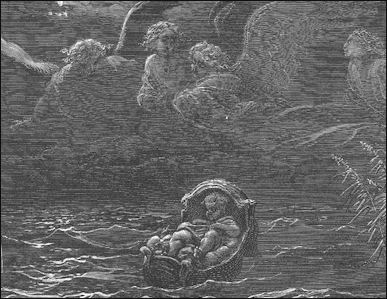
Moses on the Nile According to the BBC: “The story of the infant Moses being set adrift in a basket bears remarkable similarities to an old Babylonian myth about a great King called Sargon who was discovered as a baby in a basket in a river. Between 600 and 300 BCE, Jewish scribes in Jerusalem set out to record all the old tales of their people, handed down from generation to generation. What if the scribes had wanted to add a bit of spice to their tales to make them more interesting? Could they have used the myth of Sargon and made up the tale of Moses? It's certainly possible as we know the Jews were captured by the Babylonians in 587 BCE and held in exile in Babylon (modern Iraq) for some time. They could have picked up the Sargon legend there. [Source: BBC |::|]
Egyptologist Jim Hoffmeier studied the original Hebrew text and found that key words in the story — bulrushes, papyrus, Nile, riverbank — were all ancient Egyptian words, and not Babylonian. On top of this the name 'Moses' — an Egyptian name meaning 'One who is born' — uses the same root as 'Ramses'. It' seems implausible that a Hebrew scribe, one thousand years after the events are said to have taken place, could have dreamed up a story using authentic Egyptian words. Hoffmeier told the BBC: “Actually there are many stories of babies being put in baskets and exposed or put in water. This was an ancient way of putting a child out to the fate of the gods. Today people put babies in baskets and put them on church doorsteps.” |::|
Legend of Sargon and Its Parallels with the Moses Story
The birth story of Moses (Exodus 2:1-10) was probably recorded during the tenth century B.C. It has similarities with the birth account of King Sargon, who lived near the end of the third millennium B.C in Mesopotamia. It doesn’t seem improbable that people in ancient times hid unwanted children in such a way that they were found by rich or powerful people so the child wouldn’t have to die or force a family to struggle more than it already was. [Source: piney.com]
The Sargon account Cuneiform texts reads: 1. Sargon, the mighty king, king of Akkadê am I,
2. My mother was lowly; my father I did not know;
3. The brother of my father dwelt in the mountain.
4. My city is Azupiranu, which is situated on the bank of the Purattu [Euphrates],
5. My lowly mother conceived me, in secret she brought me forth.
6. She placed me in a basket of reeds, she closed my entrance with bitumen,
7. She cast me upon the rivers which did not overflow me.
8. The river carried me, it brought me to Akki, the irrigator.
[Source: George A. Barton, “Archaeology and The Bible,” 3rd Ed., (Philadelphia: American Sunday-School Union, 1920), p. 310]
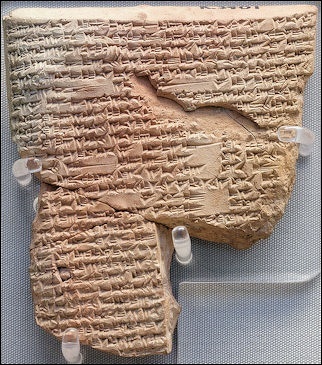
cuneiform tablet with the birth of Sargon story
9) Akki, the irrigator, in the goodness of his heart lifted me out,
10. Akki, the irrigator, as his own son brought me up;
11. Akki, the irrigator, as his gardener appointed me.
12. When I was a gardener the goddess Ishtar loved me,
13. And for four years I ruled the kingdom.
14. The black-headed peoples I ruled, I governed;
15. Mighty mountains with axes of bronze I destroyed (?).
16. I ascended the upper mountains;
17. I burst through the lower mountains.
18. The country of the sea I besieged three times;
19) Dilmun I captured (?).
20. Unto the great Dur-ilu I went up, I . . . . . . . . .
21 . . . . . . . . . .I altered. . . . . . . . . . . . . . .
22. Whatsoever king shall be exalted after me,
23. . . . . . . . . . . . . . . . . . . . . . . . . . . . . . . . . . . .
24. Let him rule, let him govern the black-headed peoples;
25. Mighty mountains with axes of bronze let him destroy;
26. Let him ascend the upper mountains,
27. Let him break through the lower mountains;
28. The country of the sea let him besiege three times;
29. Dilmun let him capture;
30. To great Dur-ilu let him go up.
The rest of the text is broken.
The German journalist Werner Keller wrote: “The basket-story is a very old Semitic folk-tale. It was handed down by word of mouth for many centuries. The Sargon legend of the third millennium B.C. is found on Neo-Babylonian cuneiform tablets of the first millennium B.C. It is nothing more than the frills with which prosperity has always loved to adorn the lives of great men.” [Source: Werner Keller, “The Bible as History,” 2nd revised Ed. Morrow & Co, NY, page 123, Skeptically.org]
Birth and Infancy of Moses in the Muslim Story
According to the Koran: “A hundred years after the death of the Prophet Joseph, the rulers of Egypt passed a decree that a son born to an Israelite parent would be put to death; only daughters would be spared to serve the followers of Pharaoh. This was a 'dreadful torment' inflicted on Israelites. During this dreaded era, Moses was born; his mother was, however, commanded by God not to cast the child into the river on birth, but to suckle him till such time as she felt that there was real danger to his life. For about three months she reared him and then she put him in a box and lay it in the river. God promised her that her child would be safe, that he would soon be restored to her, and that he would be made 'one of our apostles'. [Source: Saulat Pervez, Quran, whyislam.org, December , 2014]
The box was carried by the River Nile to the banks close to the palace of Pharaoh. A servant of Pharaoh who was passing by picked up the box and took the child to the Queen. Pharaoh was informed, and he ordered that the child be put to death. But the Queen, who was childless, was enchanted by the baby. She said, God had made him 'such a lovely child that the beholder could not but love him'. She beseeched Pharaoh to spare his life. 'Let us adopt him. He will be raised in our palace and would never know that he was an Israelite. He will be one of us and will, in fact, be useful in our fight against the Israelites.'|::| “Pharaoh relented. The Queen took to Moses as a mother would to her own new-born son. But the baby was restless and cried incessantly; no nurse was able to feed him.|::|
“Moses' mother, who felt utterly bereft without her child, had asked ten-year-old daughter to follow the course of her brother's journey in the box, and to keep a watch on him. The little girl did as she was told. She entered the palace after the baby was taken there and managed to get close to the Queen, eventually gaining her confidence.|::|
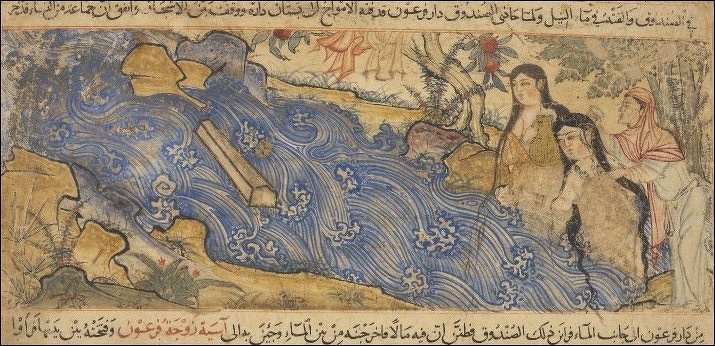
Muslim story: Asiya finds Moses
“As the child became weak through lack of nourishment, she talked to the Queen of a 'particular' nurse who might be able to suckle the child, to feed him with great affection and to bring him up. 'Thus', says Allah in the Quran, 'We restored Moses to his mother, so that her eyes might be cooled and she would cease to grieve and would know that Allah's promise was fulfilled.'” |::|
Image Sources: Wikimedia, Commons, Schnorr von Carolsfeld Bible in Bildern, 1860
Text Sources: Internet Jewish History Sourcebook sourcebooks.fordham.edu “World Religions” edited by Geoffrey Parrinder (Facts on File Publications, New York); “ Encyclopedia of the World’s Religions” edited by R.C. Zaehner (Barnes & Noble Books, 1959); “Old Testament Life and Literature” by Gerald A. Larue, New International Version (NIV) of The Bible, biblegateway.com; Wikipedia, National Geographic, BBC, New York Times, Washington Post, Los Angeles Times, Smithsonian magazine, Times of London, The New Yorker, Reuters, AP, AFP, Lonely Planet Guides, and various books and other publications.
Last updated March 2024
